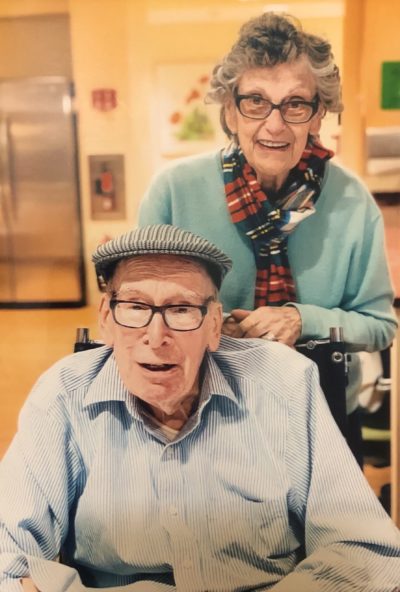How Dementia Patients Are Coping During The Pandemic
At a healthcare center in Massachusetts, patients with dementia face the challenges and loneliness of the coronavirus lockdown.
 This article is part of The State of Science, a series featuring science stories from public radio stations across the United States. This story by Miriam Wasser originally appeared on WBUR in Boston, Massachusetts on May 20, 2020.
This article is part of The State of Science, a series featuring science stories from public radio stations across the United States. This story by Miriam Wasser originally appeared on WBUR in Boston, Massachusetts on May 20, 2020.
Across Massachusetts, the coronavirus pandemic has separated families from their loved ones in nursing homes, and created new challenges for staff who are trying to stop the virus from spreading. Navigating this pandemic is always difficult, but it’s particularly complicated when you’re caring for someone who has dementia—a reality that Helene Oppenheimer has come to realize all too well.
Oppenheimer and her husband, Martin, moved to NewBridge on the Charles in 2011. NewBridge is a beautiful sprawling retirement home in Dedham that offers independent and assisted living options, including long-term memory care. Martin had recently been diagnosed with Alzheimer’s Disease at the time, so living in a continuing care retirement community felt like a good option to the family.
“I’m pleased with the help I get. I’m pleased with the help my husband gets,” Helene says. “There are all kinds of accommodations made for people.”
The Oppenheimers have been married for 60 years and have always spent a lot of time together. Helene says she liked the social aspects of NewBridge life a little more than Martin when they first arrived, a difference that deepened as his memory continued to deteriorate.
“If I went out, he would say, ‘please give me a note as to where you’re going and what time you will be back,” she says. “He didn’t mind my going out, but he didn’t want to be alone too long.’ ”
The arrangement worked for a while, but about two years ago, Helene realized that Martin needed more care.

“Martin, when we were sending him over to long-term care, he said, ‘if that’s where you think I should be, I trust you,’ ” she says.
Martin moved into the memory care building and Helene remained in their apartment with their cat Plato. She says that, while she visited every day, living apart was stressful and emotionally difficult. Martin didn’t understand where he was, and he didn’t like being without her, she says.
And that was before the coronavirus pandemic.
Despite being on the same campus, the Oppenheimers haven’t seen each other since mid-March.
“Am I stressed? All the time? Do I cry? Yes, I cry. I love him dearly and don’t like being away from him. We had a wonderful marriage,” she says. “Does he miss me? Yes, he misses me. He asks me all the time why I can’t be there.”
Families who separated from loved ones in nursing homes because of the pandemic are struggling everywhere. But when the person has Alzheimer’s or another form of dementia. One big one is the tension between infection control and maintaining daily routines, says Olivia Liff.
Liff, a geriatric specialist at NewBridge, says that while it might be ideal for residents’ physical health to keep them separate, a lack of regular social interaction is not good for their overall wellbeing.
“It’s safer for both the patients and the staff to keep people in more of a quarantine setting,” she says. “But oftentimes people in memory support do better when they’re together with other patients and the care providers that are regularly on the unit.”
No two people with dementia are exactly alike, but Liff says patients often exhibit “behavioral disturbances” like anxiety or agitation. In normal times, teams of specialists work together to help residents keep these behaviors at bay, she says, “but that becomes enormously challenging when we’re treating people with the very strictest infection control precautions.”
What’s more, a lot of the strategies other senior care facilities have implemented don’t work with memory care patients. Liff says she can’t expect any of her residents to quarantine in their rooms or wear masks.
So instead it’s up to staff—who do wear masks—to adapt. The NewBridge Memory Care building is separated into “neighborhoods,” which house 14 people each and have their own “living rooms” and “dining rooms.” During the pandemic, staff have further divided these neighborhoods so that if residents do leave their rooms and wander, they can only interact with a few other people.

These smaller units also helped staff separate residents who tested positive for the virus from those who didn’t. (According to a NewBridge spokeswoman, seven residents in the memory care facility tested positive for the coronavirus. Three of the residents died and the other four have recovered.)
“We know that any type of transition, even a transition within the building, can be a significant stressor,” Liff says. “So we’ve been lucky, actually, to keep most of the patients in place.”
The coronavirus pandemic has posed another unique challenge for those working with dementia care patients. How much do you tell them about it? And what if they ask questions?
This is something Helene has certainly thought about a lot in recent weeks because Martin likes to read the newspaper every day.
“One day when I called him, he got really upset. He said, ‘Something’s here, something’s come. A terrible thing has happened. We have something like the plague,’ ” she says. “And I said, ‘It isn’t the plague. But you’re right, it’s a terrible thing. And it has affected our ability to be together.’ ”
Helene says that as Martin’s Alzheimer’s has progressed over the years, he gets upset and anxious more easily. He also worries about her health and safety a lot, so she didn’t want to tell him any details about the pandemic. She also doesn’t think he’d really understand or absorb the information.
“I think he’s indicated to me that he’s a little scared over there when I’m not with him. And would he be scared if he really understood the pandemic? Yes, I’m sure he would be,” she says.
Liff says families ask her all the time whether to tell their loved ones with dementia about the coronavirus. Unfortunately, there’s no easy answer—especially when you’re dealing with someone with advanced cognitive decline.
You can tell the person, but they probably won’t remember.
“I think for families, and even as providers, we feel an obligation to be open and honest with people,” she says. But they probably won’t remember, “and there’s no reason to keep telling them bad news because they will experience that bad news as if it’s the first time every time, and it’s just unfair to do that to them.”
So for now, Helene is trying to take things with Martin day-by-day—calling him often, answering his questions carefully and comforting him however she can. Meanwhile, she’s looking forward to the day when she can visit Martin again.
Read Miriam Wasser’s story and more reporting on WBUR. Find out more about the state of nursing homes in our State of Science segment.
Invest in quality science journalism by making a donation to Science Friday.
Miriam Wasser is a reporter for WBUR’s environmental vertical, EarthWhile in Boston, Massachusetts.